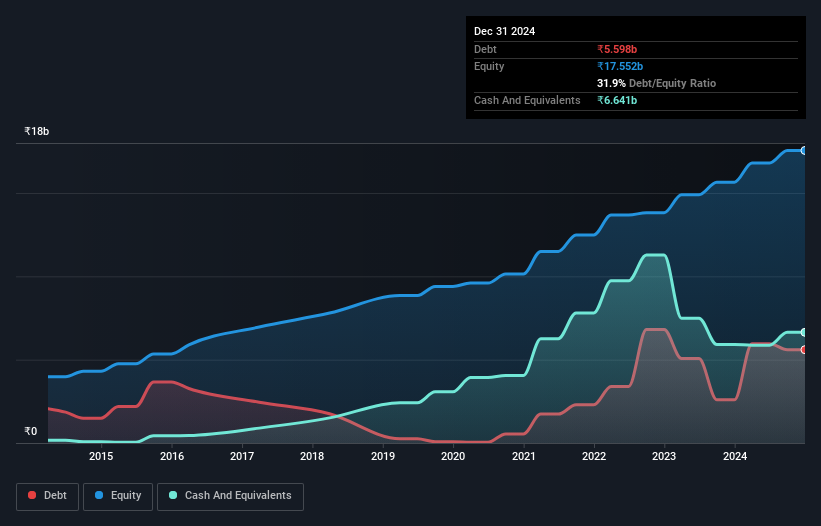David Iben put it well when he said, 'Volatility is not a risk we care about. What we care about is avoiding the permanent loss of capital.' When we think about how risky a company is, we always like to look at its use of debt, since debt overload can lead to ruin. As with many other companies Kalyani Steels Limited (NSE:KSL) makes use of debt. But the real question is whether this debt is making the company risky.
When Is Debt A Problem?
Generally speaking, debt only becomes a real problem when a company can't easily pay it off, either by raising capital or with its own cash flow. Part and parcel of capitalism is the process of 'creative destruction' where failed businesses are mercilessly liquidated by their bankers. However, a more frequent (but still costly) occurrence is where a company must issue shares at bargain-basement prices, permanently diluting shareholders, just to shore up its balance sheet. Of course, plenty of companies use debt to fund growth, without any negative consequences. The first step when considering a company's debt levels is to consider its cash and debt together.
What Is Kalyani Steels's Debt?
The image below, which you can click on for greater detail, shows that at September 2024 Kalyani Steels had debt of ₹5.60b, up from ₹2.60b in one year. But it also has ₹6.64b in cash to offset that, meaning it has ₹1.04b net cash.

How Healthy Is Kalyani Steels' Balance Sheet?
We can see from the most recent balance sheet that Kalyani Steels had liabilities of ₹9.13b falling due within a year, and liabilities of ₹725.1m due beyond that. On the other hand, it had cash of ₹6.64b and ₹4.69b worth of receivables due within a year. So it can boast ₹1.48b more liquid assets than total liabilities.
This short term liquidity is a sign that Kalyani Steels could probably pay off its debt with ease, as its balance sheet is far from stretched. Succinctly put, Kalyani Steels boasts net cash, so it's fair to say it does not have a heavy debt load!
View our latest analysis for Kalyani Steels
On the other hand, Kalyani Steels's EBIT dived 11%, over the last year. If that rate of decline in earnings continues, the company could find itself in a tight spot. There's no doubt that we learn most about debt from the balance sheet. But it is Kalyani Steels's earnings that will influence how the balance sheet holds up in the future. So when considering debt, it's definitely worth looking at the earnings trend. Click here for an interactive snapshot.
Finally, while the tax-man may adore accounting profits, lenders only accept cold hard cash. While Kalyani Steels has net cash on its balance sheet, it's still worth taking a look at its ability to convert earnings before interest and tax (EBIT) to free cash flow, to help us understand how quickly it is building (or eroding) that cash balance. Over the last three years, Kalyani Steels saw substantial negative free cash flow, in total. While that may be a result of expenditure for growth, it does make the debt far more risky.
Summing Up
While it is always sensible to investigate a company's debt, in this case Kalyani Steels has ₹1.04b in net cash and a decent-looking balance sheet. So we are not troubled with Kalyani Steels's debt use. When analysing debt levels, the balance sheet is the obvious place to start. However, not all investment risk resides within the balance sheet - far from it. For example - Kalyani Steels has 1 warning sign we think you should be aware of.
When all is said and done, sometimes its easier to focus on companies that don't even need debt. Readers can access a list of growth stocks with zero net debt 100% free, right now.
Valuation is complex, but we're here to simplify it.
Discover if Kalyani Steels might be undervalued or overvalued with our detailed analysis, featuring fair value estimates, potential risks, dividends, insider trades, and its financial condition.
Access Free AnalysisHave feedback on this article? Concerned about the content? Get in touch with us directly. Alternatively, email editorial-team (at) simplywallst.com.
This article by Simply Wall St is general in nature. We provide commentary based on historical data and analyst forecasts only using an unbiased methodology and our articles are not intended to be financial advice. It does not constitute a recommendation to buy or sell any stock, and does not take account of your objectives, or your financial situation. We aim to bring you long-term focused analysis driven by fundamental data. Note that our analysis may not factor in the latest price-sensitive company announcements or qualitative material. Simply Wall St has no position in any stocks mentioned.
About NSEI:KSL
Solid track record with excellent balance sheet and pays a dividend.
Similar Companies
Market Insights
Community Narratives




